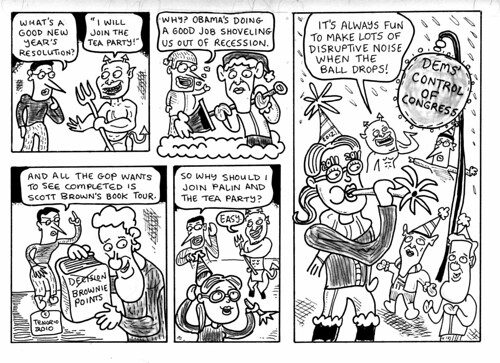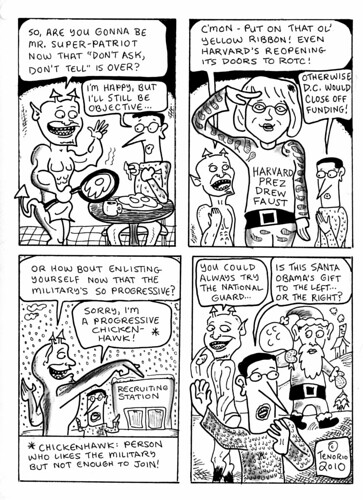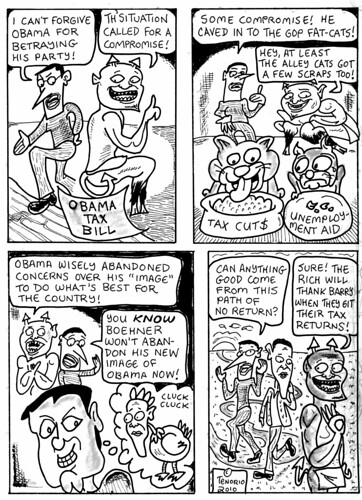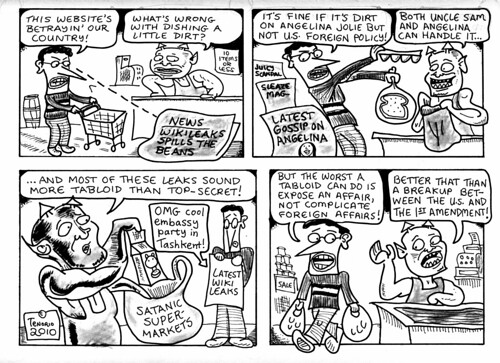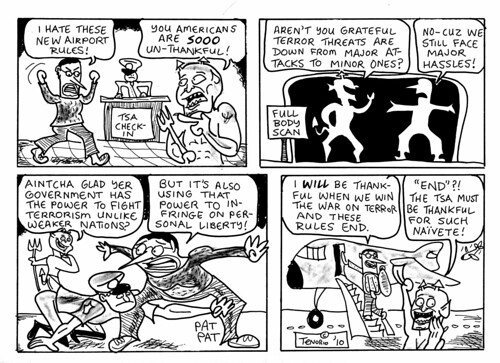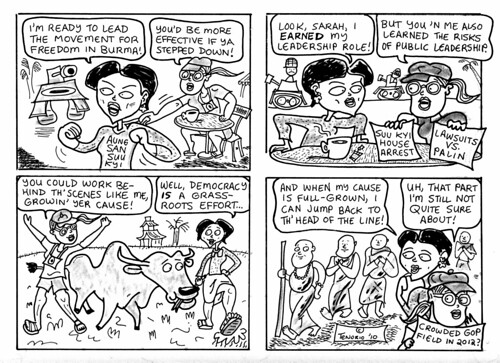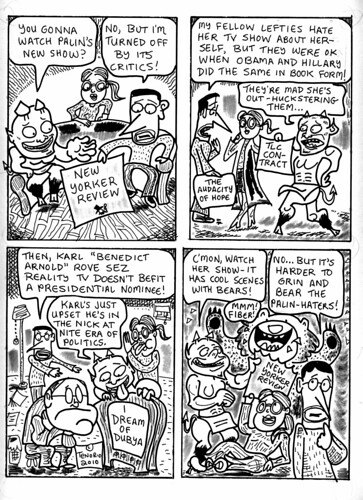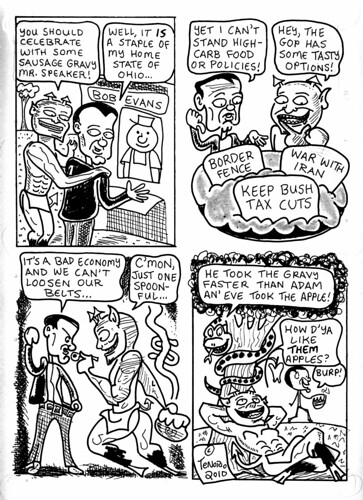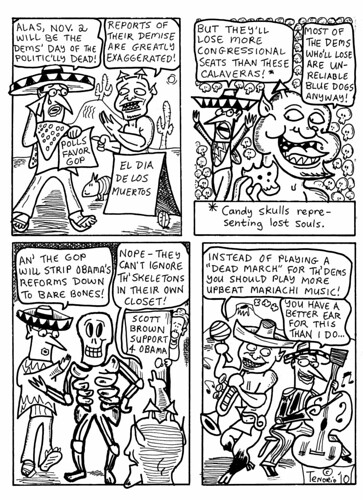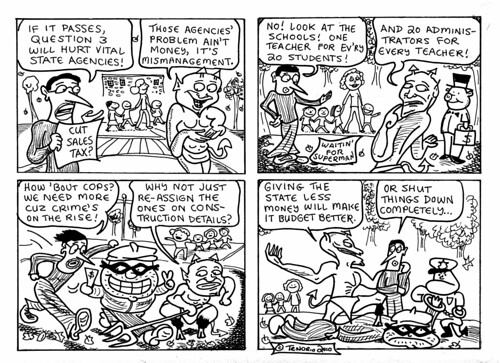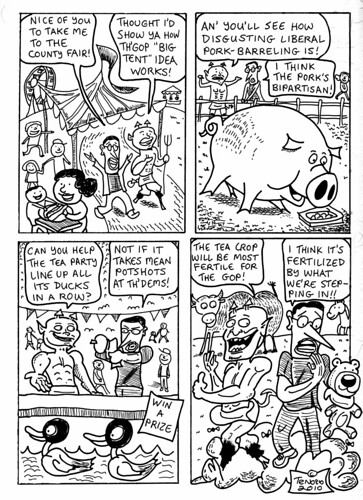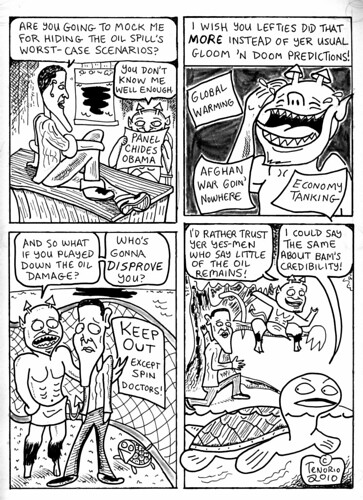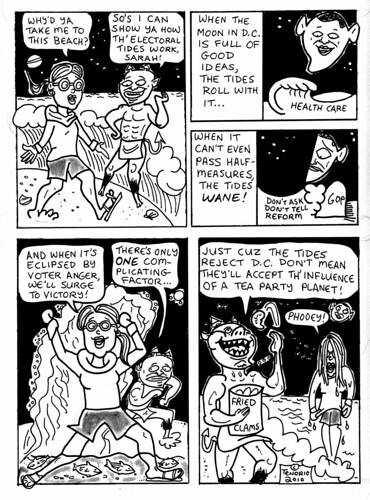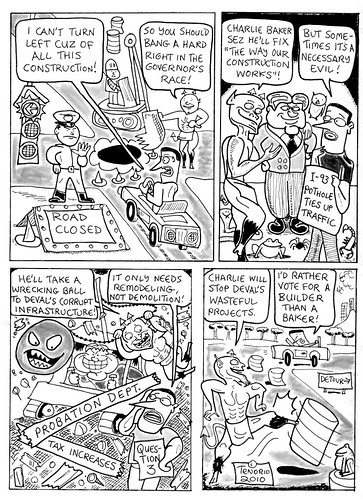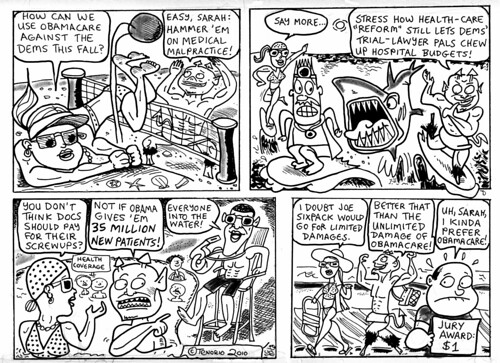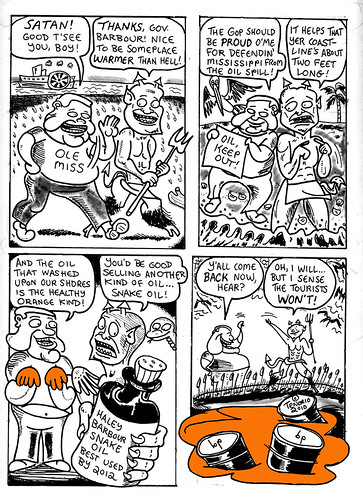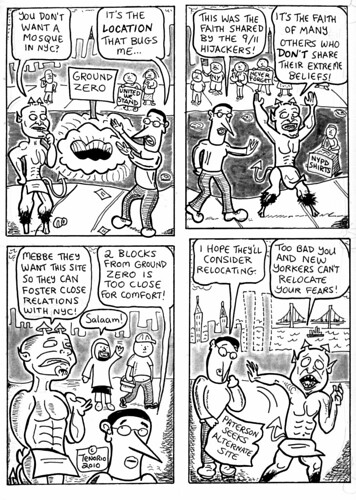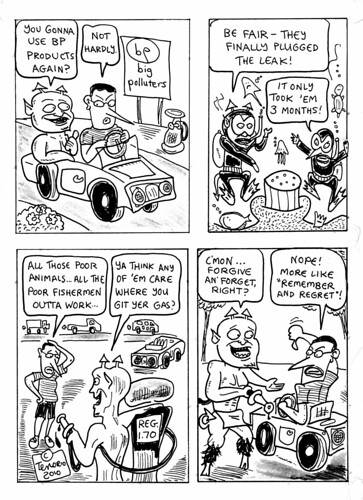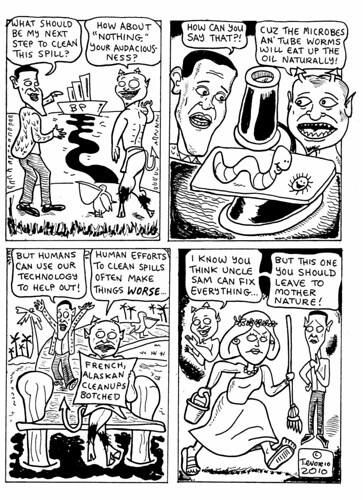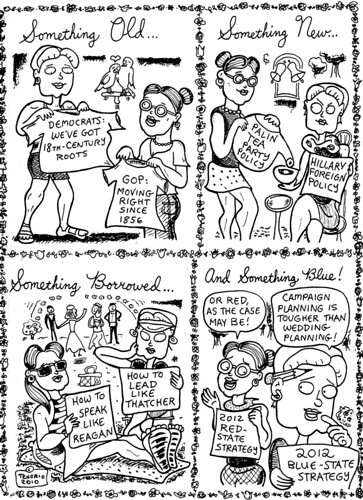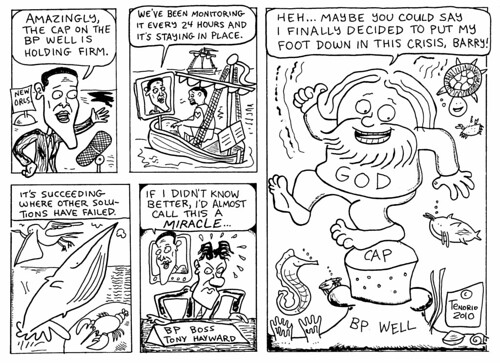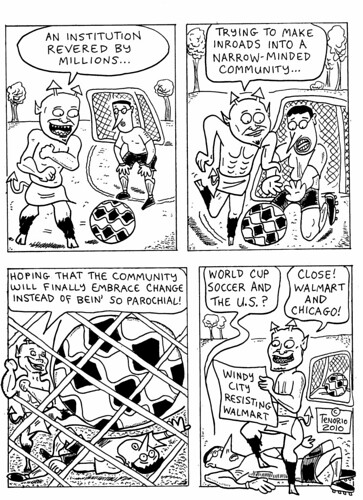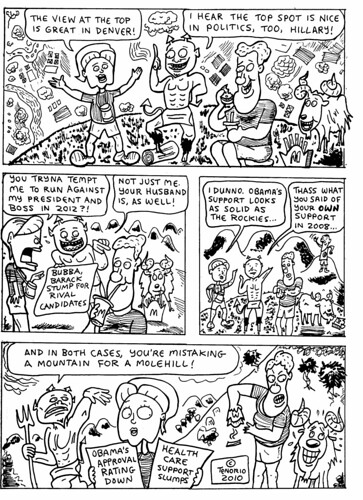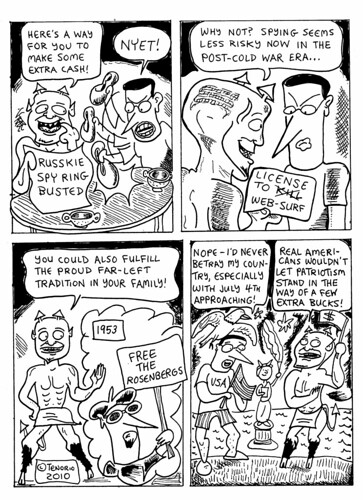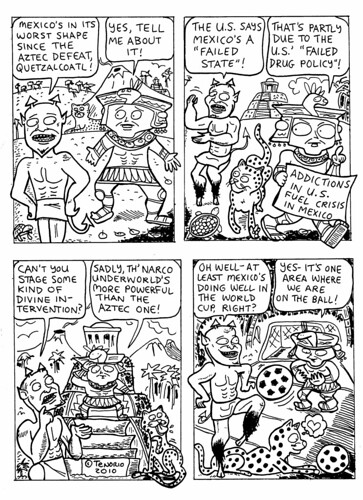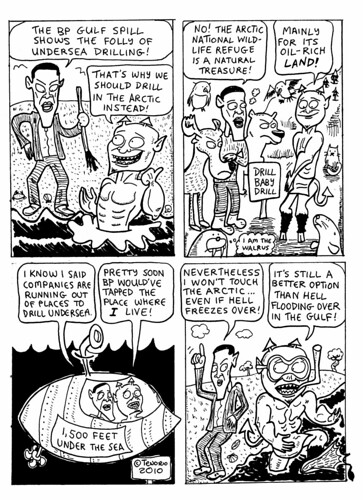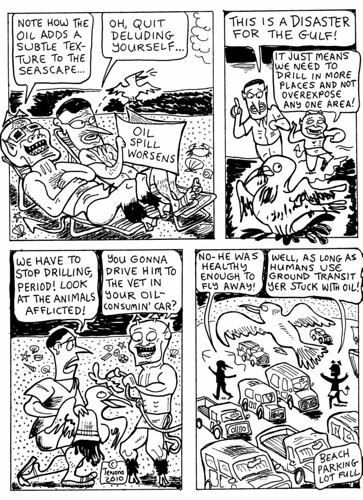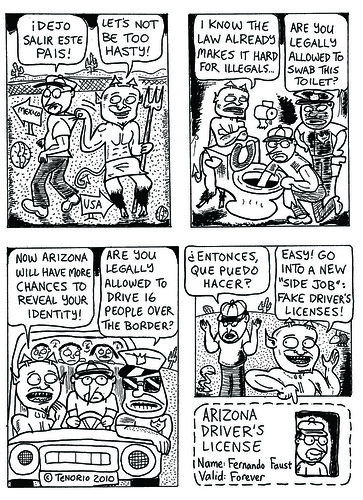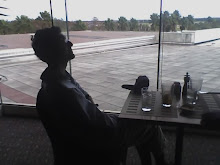Satan and Frank Faust party with President Obama, Scott Brown and Sarah Palin in a New Year's Eve edition of "The Devil Made Me Blog It!"
Happy New Year, everyone!
Friday, December 31, 2010
Obama, Palin, Brown Ring In 2011
Thursday, December 23, 2010
Don't Ask Don't Tell: That's a Wrap!
President Obama has repealed the 17-year-old Don't Ask Don't Tell law that kept gays from revealing their identity in the military. Who will ultimately benefit from the repeal -- the Left, or the Right? Satan and Frank Faust discuss in a holiday-themed episode of "The Devil Made Me Blog It"!
Saturday, December 11, 2010
Tax Cuts: Path of No Return?
President Obama wants to extend the Bush tax cuts, and his fellow Democrats aren't happy. Satan and Frank Faust pick up the debate in the latest episode of "The Devil Made Me Blog It"!
Friday, December 3, 2010
Wikileaks: More Tabloid Than Top-Secret
The US' international policy is in big trouble. The notorious Wikileaks website is letting the world know about the most top-secret American diplomatic dealings. Or is this really the case? Leave it to that eternal devil's advocate, Satan, to say that Wikileaks is nothing more than a supermarket tabloid for the cloak-and-dagger set in the latest episode of "The Devil Made Me Blog It"!
Wednesday, November 24, 2010
Putdowns for Patdowns
If you've gone on an airplane for a Thanksgiving trip this year, chances are you've endured the TSA's latest security measures, including full-body scans and patdowns. Satan and Frank Faust gauge the effectiveness of such measures in the latest episode of "The Devil Made Me Blog It"!
Happy Thanksgiving, everyone!
Friday, November 19, 2010
Can Aung San Suu Kyi Succeed? You Betcha!
The government of Myanmar has released Nobel laureate Aung San Suu Kyi from house arrest and all signs are that she will retake the helm of the Burmese democracy movement. Yet could she work more effectively behind the scenes? Sarah Palin, who knows a thing or two about grass-roots movements, puts on her American tourist attire to chat up Suu Kyi in the latest episode of "The Devil Made Me Blog It"!
Thursday, November 11, 2010
Palin's Unbearable Reviewers
Sometimes a cartoon just draws itself -- as was the case with this one, a reaction to the New Yorker review of Sarah Palin's upcoming reality TV show, in the latest episode of "The Devil Made Me Blog It"!
Friday, November 5, 2010
GOP to Ride Sausage Gravy Train?
Ohio Republican Congressman John Boehner will become the next Speaker of the House ... and Satan takes him out to Bob Evans to celebrate with that Buckeye State delicacy -- sausage gravy -- in the latest episode of "The Devil Made Me Blog It"!
Tuesday, November 2, 2010
Can Deval Tap Into Right Outlets?
Outlet voters swarmed to the Republican checkout line to vote for two popular members of their party in the last 10 years: Mitt Romney in the governor's race in 2002; and Brown in the special election for Senate earlier this year. Both candidates won.
You see the power in these outlet voters when you watch them at non-political events, from shopping at the IKEA in Stoughton to cheering on the Pats at Gillette Stadium. It was these outlet voters that the great New York Times columnist David Brooks unconsciously evoked when he penned his great paean to the exurbs back in the George W. Bush era. (Yes, their counterparts nationwide loved Dubya.)
For Gov. Deval Patrick, a Democrat who represents everything the outlet voters dislike -- taxing the rich to help the poor, more social services, increased government in general -- the key to winning this election is straight out of the Sun Tzu playbook: If an enemy is strong, avoid them. I'm predicting and hoping Patrick -- who represents more of what I like than Republican rival Charlie Baker -- will avoid them enough to win this race.
He has avoided them in one way by not stirring up their wrath like fellow Democrats in the past. Former state treasurer Shannon O'Brien offended their sensibilities when she joked about having a tattoo ... paving the way for Mitt's win eight years ago. Current state AG Martha Coakley slandered Fenway Park and Curt Schilling, double no-nos that cost her brownie points against Brown. Deval has played it more prudently.
He also has the fortune of a spoiler in the race, current treasurer Tim "Pick Six" Cahill. Polls report a consistent six percent for the independent from Quincy, which is sort of in the northern hemisphere of the South Shore outlet belt. Cahill's Andrew Jackson-like populism -- in debates, he spoke up for the spoils system and likened his style to the Founding Fathers' -- may resonate with outlet voters who'd otherwise go for Baker.
There are, of course, pitfalls. Patrick seems to have all but written off courting outlet voters directly, ceding the attack-ad space to Baker during sporting events on TV and talk radio. (Kudos to Coakley and Democratic auditor candidate Suzanne Bump for not following the governor's example here.) This puts a lot on Cahill's shoulders, and Cahill does not seem to have any ads during these times either. Worse yet, the treasurer has run an opera-buffa campaign that overshadows the candidate's decent performance in the debates.
Still, Patrick may have done just enough to outmaneuver the outlet voters and get the rest of Massachusetts to vote for him today.
Monday, November 1, 2010
MA Governor's Race: Mediocrity vs. Shortsightedness
Patrick and Baker are neck-and-neck in this Massachusetts governor's race, with Patrick's neck being a tad taller as of October 27. In a Rasmussen poll from that day, Patrick outpolled Baker 46 percent to 44. I hope that lead stands on Election Day.
Four years ago, Patrick was an intriguing insurgent, beating out Democratic Party rivals who were more establishment (Tom Reilly) or more big-money (Chris Gabrieli) and then a Republican who combined a bit of both (Kerry "Muffy" Healey). Yet as he defends his incumbency, it's clear that his administration has not lived up to its promise.
He has not delivered on the property-tax reform he promised ... and he's added new taxes to an economically hurting Commonwealth. He also fought a protracted war on a casino issue that seems like a shortsighted way to bring more dollars to Massachusetts.
That said, he does have some accomplishments to point to. He passed the politically unappetizing but pragmatic CORI reform. He's fought for green jobs in the wind industry that look more sensible in the wake of the BP oil spill. He took on the police unions in another battle, this one on flaggers, and emerged with a victory of sorts.
When I met Patrick at the State House on Inauguration Day in Boston in January 2007, he seemed positive and welcoming -- not just to me, but also to all the citizens of Massachusetts who stood in line to greet him that day. It seems that he has kept that sense of optimism despite the economic difficulties that began in the fall of 2008 ... and it is that hopefulness which strengthens Patrick's case for reelection.
In my spare time I draw cartoons about a modern-day Faust and the devil, and Baker has certainly made his own share of temptations for voters: Cut state government ... cut taxes ... cut spending projects. These seem even more misleading than Patrick's past promises to cut property taxes. Both of these Big Government/Big Business veterans know that government has been trending bigger, not smaller, over time ... and the tax increases did not begin with Patrick but rather with the "fee hikes" of his GOP predecessor, Mitt Romney.
Patrick deserves a second four years on Beacon Hill. But really Deval, I hope four years from now there'll be more achievements to tout than windmills and orange flags.
Thursday, October 28, 2010
Midterm Mariachis for Democrats
Two major occasions are coming up soon -- the Mexican festival of El Dia de los Muertos and the American festival of Election Day. Satan persuades Frank Faust that once the partying is over, the Democratic Party will defy the pundits' predictions and be alive and kicking. Read more in the latest episode of "The Devil Made Me Blog It"!
Friday, October 22, 2010
3 Or Not 3, That Is the Question
Ballot question 3 in Massachusetts would cut the state sales tax if passed (by a few percentage points). Would the gain to consumers be offset by losses to education and police funding? Satan and Frank Faust weigh the pros and cons in the latest episode of "The Devil Made Me Blog It"!
Friday, October 15, 2010
A Day at the County Fair
County fair season is in full swing, with New Englanders celebrating the recent Topsfield Fair in Massachusetts. Satan and Frank Faust spend a day at the fairgrounds talking Campaign 2010 in the latest episode of "The Devil Made Me Blog It"!
Friday, October 8, 2010
Oil Spill Hide 'n Seek
A panel investigating the BP oil spill has criticized President Obama for downplaying the effects on the environment. Satan reassures him in the latest episode of "The Devil Made Me Blog It"!
Merci to my muse for the idea...
Friday, October 1, 2010
Yoga Parking Tickets in Cambridge
The city of Cambridge, Mass. has adopted a new twist for its parking tickets: They now come with yoga instructions. Thanks to the input of a 2010 resident artist, tickets depict meter reader and parking violator as a silhouetted pair performing yoga together. "Breathe out, reach back to give and receive the citation," a sample ticket reads.
This project, titled "Citation Salutation," is described as "an alternative method of giving and receiving parking citations." It comes off as more shallow than enlightened. The city didn't do anything to truly relieve stress ... like reducing the fines ... or the late penalties that are rather Draconian, such as potential seizure of a motor vehicle.
It is up to Satan to suggest "an alternative method" of reacting to yoga parking tickets in the latest episode of "The Devil Made Me Blog It"!
Friday, September 24, 2010
Harvest Moon, GOP Star
Maybe you had a chance to see the beautiful harvest moon in the evening sky this week. Satan and Sarah Palin talk a little astronomy -- and a little political science -- under the moonlight in the latest episode of "The Devil Made Me Blog It"!
Thursday, September 16, 2010
Charlie Baker's Constructive Criticism
If you've driven in Massachusetts lately, you've noticed there's an awful lot of construction projects going on. Charlie Baker, the GOP candidate for governor here, says we've got to rein them in, while Democratic incumbent Deval Patrick wants to give them free rein. Satan praises Baker's constructive criticism to Frank Faust in the latest episode of "The Devil Made Me Blog It"!
Wednesday, September 8, 2010
Cahill: Andrew Jackson from Quincy
Cahill distanced himself from both Democrat incumbent Deval Patrick and Republican challenger Charlie Baker. "Charlie blames the governor, and the governor blames Charlie," Cahill noted at one point. Later, he said, "Ten years (from now), in another subsequent debate, someone will be blaming (someone) for something else." Comments like these, plus his Boston accent, helped Cahill portray himself as a sort of Andrew Jackson from Quincy, the plain-spoken common man telling it like it is.
And he did tell it like it is. Cahill came out against public binge spending -- "No more $200 million high schools" -- in the wake of the extravaganza in Newton. When Baker brought up patronage, Cahill provided historical perspective. "The GOP loaded up Massport on the eve of 9-11," he said. "They stuck up for patronage."
All of this would come off better if Cahill hadn't dumped his own party after serving as treasurer to run against his former boss Patrick as well as Baker and Green-Rainbow candidate Jill Stein. Still, Cahill scored some successes in the debate. Even if he doesn't win, the Andrew Jackson from Quincy has made a good impression in this race.
Thursday, September 2, 2010
Cop vs. cyclist in Cambridge
Seems there was a bit of a bicycle brouhaha in Central Square, Cambridge, last Friday night, between policeman Raymond Pina and cyclist Yonatan Kurland, who was participating in an irresponsible event called Critical Mass -- a form of not-so-civil cyclist disobedience. The two became involved in an altercation near a CVS on Massachusetts Avenue. Kurland wound up on the ground. Let's just say their accounts differ. From Boston.com:
Pina stated in his report that Kurland was traveling swiftly, weaving through other cyclists on the street, and would have clipped him if he hadn’t grabbed the handle bars on Kurland’s bike. The officer said the momentum dragged him.
Kurland’s account differs drastically from Pina’s. Kurland said he was traveling slowly in the bicycle lane, about 30 feet from the intersection, when Pina approached, grabbed the front of his bike, and pushed him to the ground, leaving Kurland with minor road rash.
I feel bad that Kurland was hurt. Yet I also feel that bicyclists are bringing bad karma upon themselves through events like Critical Mass -- an event designed to show how oh-so-superior they are to motorists.
Created in San Francisco, Critical Mass has spread to other metropolitan areas like greater Boston and foists disobedient cyclists upon streets already clogged with cars. The event seems designed for cyclists to waggle their fingers at the rules of the road with which everyone else has to comply.
A "me-first" attitude is ugly whether it's displayed by a cyclist or motorist. But lately the cyclists are cornering the market. If they hold up traffic, it makes it harder for ambulances, fire trucks or police vehicles to get through. If they are so concerned about environmental standards, they should care more about all that exhaust being released by motorists waiting for them to pass. And if they're participating in a form of social protest demanding more rights for cyclists in Cambridge ... a city that closes off Memorial Drive to motorists and has plenty of bike paths ... well, that just proves the adage, "Give 'em an inch and they'll take a mile."
I hope Kurland is OK ... but I also hope cyclists stop the selfishness and start using the bike paths more often.
Wednesday, September 1, 2010
Will Palin Mess With Medical Malpractice?
This fall, one of Republicans' top priorities will be to deep-six Obamacare ... and one way to do it might be to point out that the Dems weren't willing to compromise with them on medical malpractice reform. Join beach bums Satan and Sarah Palin for a day of scheming and sunshine in the latest episode of "The Devil Made Me Blog It!"
Wednesday, August 25, 2010
The Barbour of Mississippi
If the Gulf oil spill made a hero out of anyone, you could argue that it was Mississippi Gov. Haley Barbour. The former Republican national chairman did a creditable job helping Mississippians deal with the spill. Yet are Haley's hopes for the 2012 GOP presidential nod as unrealistic as his "come on in, the water's fine" attitude towards Gulf tourism? Read more in the latest episode of "The Devil Made Me Blog It"!
Friday, August 20, 2010
Out of Iraq
While much angst has been expressed at the worsening of the Afghan War, the news from Iraq is better. The last American combat unit has left Iraq seven years after the US invaded the Mideast nation.
“Troops from the Army’s 4th Stryker Brigade, 2nd Division, drove through the night and arrived in Kuwait just before 4 a.m. local time,” the New York Post reported on Thursday.
I’m happy that the troops’ mission is completed, happy for the loved ones who I hope will see them home soon, and happy that a war that, pre-surge, seemed as out of control as Afghanistan looks today now appears headed toward a satisfactory resolution. (If only the media shared this good news along with all the bad news from Afghanistan. Even the pro-military Post buried the story with a mere four paragraphs on Page 16, although there is a longer AP story online.)
Fifty thousand US troops remain in Iraq. The military faced an Aug. 31 deadline -- a week from next Tuesday -- to decrease its presence there. It looks like mission accomplished, although “a senior administration official” told the Post that “the combat mission is not over.” Yet it may be reaching what Churchill would have called “the beginning of the end.”
I am, frankly, surprised that the Iraq War is winding up before the Afghan War. We entered Iraq under far murkier reasons and with far less international support than we did Afghanistan … and in the wake of the atrocities committed against Americans in Fallujah and the resentment Americans created with the Abu Ghraib prison scandal, it seemed like the war would never end. However, the US then adopted countermoves like the surge and pacifying locals … and they seem to have paid off. Gen. David Petraeus and Presidents Bush and Obama all deserve credit for this … some more than others.
We can’t bring back our military dead or the Iraqi civilian dead. Yet we can leave Iraq in a hopeful shape for the future. May its democracy last and its citizens know domestic tranquility.
Iraq still faces problems, but it’s good to know that the country appears to be in stable enough hands that the US can diminish its presence there so that now, we can focus on the remaining mess in Afghanistan.
Thursday, August 19, 2010
Should Ground Zero Mosque Relocate?
The move to build a mosque near Ground Zero has drawn criticism from the Right, cautious approval from the Left, and an attempt at compromise from New York Gov. David Paterson. Now it's Satan and Frank Faust's turn to weigh in ... in the latest episode of "The Devil Made Me Blog It"!
Sunday, August 15, 2010
'El Condor Pasa' over Tanglewood, Providence
For the past two days, concert venues in New England have come alive with the sound of Inca flutes and drums. The Boston Symphony Orchestra devoted Friday's concert at Tanglewood to music inspired by the Inca Empire ("Caminos del Inka"), while visitors to Waterfire in Providence Saturday also had a chance to see plume-covered dancers sway to the sounds of indigenous music in the 21st Bolivian festival of Our Lady of Urkupina.
Of the three major pre-Columbian empires in Latin America -- Aztec, Maya, Inca -- it is the Incas who have traditionally gotten the least amount of attention up North. Maybe it's because, geographically, they were a lot farther away. It is likely that more American tourists have visited Mexico City or Chichen Itza than Machu Picchu.
The past two days indicate that New Englanders are showing more interest. On Friday, the Berkshires evoked the Andes as the BSO gave its woodwind and percussion sections a different challenge than their normal Eurocentric fare. Saturday, visitors to downtown Providence could watch dancers wheel around the concert space, listen to the pipers play, and sample Bolivian cuisine such as steak, corn and plantains.
The Inca Empire lost its power long ago with the coming of Pizarro and the Spaniards in the sixteenth century. Perhaps interest in the Inca is appropriate in Western Massachusetts and Rhode Island because they, too, were the sites of confrontations between indigenous inhabitants and European arrivals. It is a welcome sign of humility for the West to recognize that history in the Americas did not begin with the European conquests ... and to celebrate pre-Columbian history through the enduring echo of the Inca flutes.
Friday, August 13, 2010
In BP We Distrust
Open question, dear readers: Now that the Gulf oil spill has been contained, would you ever use BP products again?
Wednesday, August 4, 2010
For Gulf, Greatness Inaction
Despite the devastation wrought by the Gulf oil spill, Mother Nature might be able to show some surprising resilience -- thanks to some of her smallest creations.
"(The) sea floor in the Gulf is rich in `cold seeps’ -- communities of tube worms and other organisms that live off oil naturally seeping from beneath the seabed," British writer Matt Ridley notes in The Times. "Hundreds of these clusters of clams and tube worms have been found since the 1980s in the deep waters of the Gulf of Mexico, living off the microbes that eat the oil."
This -- coupled with evidence that human attempts to clean up spills often worsen things -- might suggest that President Obama leave the cleanup work to Mother Nature. Or at least, that's Satan's advice in the latest episode of "The Devil Made Me Blog It"!
Tuesday, August 3, 2010
Parking Meters, Take a Holiday
Imagine driving down Massachusetts Avenue in Cambridge at lunchtime, seeing a tantalizing pizza place and a parking spot right outside it, and -- oops! -- having no change for the meter. Not only are you out of a lunch option, but the pizza place owner has missed out on a client, and the state is out of some tax revenue.
The big cities of the Bay State, places like Cambridge, Boston and Somerville, create a culture of unfriendliness with their legions of parking meters, some of which allow parking for a maximum time of as low as 15 minutes. Many meters allow only quarters, and oftentimes one quarter is only good for 15 minutes. Motorists who park in metered spots must constantly check their watches, interrupting their lunch to run back and put more change in the meters. And even then, they might get fined for an overtime violation.
I call on Gov. Patrick to push for a parking-meter holiday -- a stretch when motorists can park in metered spots at no charge -- to provide a hassle-free environment for drivers, and potentially more revenue for business owners. It would represent a small but significant easing of stress on drivers who already have to pay for gas and maintenance.
Granted, there might be a few wrinkles to iron out. Some drivers might abuse the privilege, parking in metered spots all day during the holiday and depriving peers of the opportunity to use the space. Perhaps Patrick could adopt a set of rules that stipulate that during the holiday, all metered spots would change to a minimum of one hour’s free parking (if the meter normally runs for one hour or less) with a maximum of two hours’ free parking (if the meter normally exceeds one hour), with normal ticketing policies in place for drivers who park beyond the allotted time.
As constituted, parking meters represent an additional tax on motorists that, while small in monetary value, is still unpleasant … kind of like the impositions that King George III, his Parliament and Govs. Bernard and Hutchinson of the Massachusetts Bay Colony wanted the colonists to pay over stamps and tea. Our present-day governor, Patrick, should not ignore the promising possibility of a parking-meter holiday as he battles for reelection.
Thursday, July 29, 2010
In Praise of Paisley, New Yorker
Staff writer Kelefa Sanneh, who once penned reviews for the New York Times, contributes a thoughtful piece on Paisley, whom the author describes as “by some counts, the best-selling singer in American history.”
Maybe it’s the persistent popularity of red-state institutions like country music and NASCAR (racetrack star Danica Patrick was also the subject of a recent New Yorker profile) that makes them so intriguing to the magazine staff … none of whom, presumably, would ask their colleagues, “Hey, did you see the ACM’s last night?” or, “Did you watch the Daytona 500?”
Which is what makes it so welcome when the magazine uses its resources to examine aspects of American pop culture that the intelligentsia often ignores. The magazine ventures outside its traditional world of sipping lattes at Starbucks, browsing Proust at the Strand and watching Audrey Hepburn at Film Forum. The results make for entertaining prose. Paisley, Sanneh reveals, disdains agave syrup and venerates Andy Griffith, whose show’s “balance of wry humor and old-fashioned decency has become a touchstone for (Paisley’s) life, and for his career,” Sanneh writes.
When Sanneh goes beyond the external details, however, the results are intriguing. Sanneh has chosen a good subject to reveal the complexity of country music today. Paisley occasionally sings about topics that both blue-state and red-state audiences might find interesting. For instance, his song “American Saturday Night” evokes terms incorporated from other countries to show us how the melting pot works (“Spanish moss, Italian ice, French kissing in the moonlight … Just another American Saturday Night.”) It’s hard to imagine Arizona Gov. Jan Brewer groovin’ to that song.
Sanneh finds Paisley similarly thoughtful on the issue of race. While the author claims that country music, while “not strictly rural music” and “not strictly Southern … remains white music, by and for white people,” this is challenged by Paisley’s song “Welcome to the Future,” which honors the work of advocates for equality such as Rosa Parks and Dr. Martin Luther King Jr., and denounces the Ku Klux Klan for its racial-intimidation tactics. Sanneh notes that African-American Darius Rucker is now a country star, and observes that Tim McGraw evokes “a multiracial form of Southern pride” in his song “Southern Voice,” which also mentions Parks and Dr. King.
Songs such as “American Saturday Night” and “Welcome to the Future” helped endear Paisley to yours truly. When first listening to him on WKLB-FM (102.5) in the Boston area, I found little to distinguish one of his songs from another. Toby Keith had his brash conservative politics (even if I disagreed with them, I found them entertaining), Garth Brooks had his lyricism, Martina McBride mixed toughness with sensitivity. It was only when Paisley started doing the same thing the New Yorker did -- exploring the wider story of America -- that he began appealing to me.
So let’s appreciate Paisley as he is: an entertaining, sometimes thoughtful guy who makes good music. And let’s appreciate Sanneh and the New Yorker for a thoughtful profile.
Wednesday, July 28, 2010
Clinton, Palin: The Members of the Wedding
Two of our most prominent politicians, Secretary of State Hillary Clinton and former Alaska Gov. Sarah Palin, will be real-life “Members of the Wedding.” (Apologies to Carson McCullers.) Clinton’s daughter, Chelsea, will marry longtime boyfriend Marc Mezvinsky in Rhinebeck, N.Y., Saturday … while Palin’s daughter, Bristol, has announced her engagement to on-again, off-again boyfriend Levi Johnston. Yet do Hillary Clinton and Sarah Palin have more on their agenda than upcoming nuptials? Read more in the latest episode of “The Devil Made Me Blog It” … and congratulations to the happy couples!
Friday, July 23, 2010
Foul Weather, Fair Result for Gulf?
"The work on permanently stopping the oil will be delayed," the BBC reported Friday. "But vessels were being positioned in a way that would allow crews 'to promptly re-start oil mitigation efforts as soon as the storm passes', (Louisiana Gov. Bobby Jindal) added."
This is probably the last thing BP wants to hear after eight days of successfully capping the oil well that started this disaster over three months ago. But if history is any guide, Bonnie might actually be a boon for the oil spill.
In 1979, National Geographic noted, "winds from Hurricane Henri scoured clean most of the Mexican beaches stained by the Gulf of Mexico's Ixtoc oil spill." (What the magazine did not mention was that the Ixtoc spill, and not the BP one, is arguably the biggest ever in the Gulf.) Perhaps a tropical storm could have a similarly beneficial effect.
The magazine cautioned that storms have negative effects on oil spill cleanup efforts, too, such as pushing oil inland, where it can contaminate wildlife habitats like marshes.
Still, maybe "My Bonnie Lies Over the Oil Spill" could ultimately be a happy tune for BP.
Wednesday, July 21, 2010
Divine Intervention in the Gulf?
After three long months, it seems that the BP oil spill has finally been contained. Was there a little bit of divine intervention in solving the problem? God guest-stars in the latest episode of "The Devil Made Me Blog It"!
Friday, July 16, 2010
The World Cup and Walmart
If you're a left-winger in the United States like me, chances are you're familiar with the lofty arguments our side makes about why more Americans should like soccer -- arguments that have been raised quite a bit during the World Cup. And yet I can't see the Left employing the same reasoning -- that we should shed our stubbornness and accept something that millions of others already enjoy -- in favor of another institution -- Walmart -- as it tries to enter the Chicago market. Satan ponders this paradox while flaunting his fancy footwork in the latest episode of "The Devil Made Me Blog It"!
PS - Congratulations to Spain for its first-ever World Cup win!
Monday, July 12, 2010
'Johnny Baseball' studies Red Sox sins, successes
If you’re a Boston Red Sox fan, chances are you know that the club went a remarkable 86 years between World Series championships -- from 1918 to 2004 -- a dry spell attributed by some to owner Harry Frazee sending Babe Ruth to the New York Yankees in 1920. The lyrics of “Johnny Baseball” ask us whether the Curse was rooted in something more heinous.
The Red Sox were the last major-league team to integrate -- in 1959, over a decade after Jackie Robinson broke the color barrier with the Brooklyn Dodgers. They also passed up chances to integrate in 1945 (when Robinson participated in a dubious tryout for the Sox) and in later years, when future star Willie Mays played on a Boston minor-league team but was not picked up by the big club. This, “Johnny Baseball” argues, and not getting rid of Ruth, is the true source of shame for the Sox.
The play makes its case in the story of its three main characters: Johnny O’Brien, a white fictional Sox pitcher in the late nineteen-teens; Daisy Wyatt, an African-American nightclub singer; and Tim Wyatt O’Brien, their African-American son. All three characters experience the sting of racism in Boston -- most poignantly when Tim, a promising minor-league pitcher, and Mays participate in a sham tryout for the Red Sox … and Johnny shows his frustration at the team’s racism by punching GM Joe Cronin, who subsequently says that Tim will never pitch in the big leagues. This leads Tim to disown his father and place a curse on the Sox.
This revisiting of history, and the subsequent redemption for both Tim and the Sox, help us see America’s game of baseball as both a symptom of and cure for America’s sin of racism. By 2004, as a young Fenway fan tells an older Tim, the Sox are a team that reflects the diversity of the United States, with players who are white, Latin American and African-American. It is time to lift the Curse … which, as we all know, the Sox did that year.
History, of course, is much more nuanced. Although the Sox were the last to integrate, once they did, fans soon became familiar with a diverse constellation of stars, such as the Cuban pitcher Luis Tiant and the African-American right fielder Jim Rice in the 1970s. Yes, racial problems persisted, such as in the Winter Haven, Fla., spring training troubles, but the increasing diversification of their roster and coaching staff (Rice became a hitting coach after his playing days ended) shows that the Sox did try, however imperfectly, to redeem the sins of their prejudiced past.
We should also ask whether baseball’s present is as upbeat as the finale of the musical. Members of the media have noted a declining African-American participation in baseball in general, not only on the Red Sox. It would be sad to see the efforts of the Robinsons and Rices go in vain. And yet on this year’s Sox, the team has seen several African-American players play notable roles, such as Darnell McDonald and Bill Hall. In baseball, as well as on stage, the hard work of redemption and reconciliation evoked by “Johnny Baseball” continues.
Thursday, July 8, 2010
Clintons Cause Colorado Conundrum?
So what are we to make of the dueling endorsements from President Obama and ex-President Clinton in Colorado? If we are to believe the odious former Clintonista Dick Morris, they may signify a challenge from Secretary of State Hillary Clinton to the president in 2012. Read more in the latest episode of "The Devil Made Me Blog It"!
Wednesday, July 7, 2010
Toby Keith Takes Over Boston
Broken-hearted fools and suckers …
~Toby Keith, “I Love This Bar”
Now, it seems, Toby Keith has added Bostonians to his camp.
Keith played Boston on the Fourth of July, and while he’s one of my favorites, it wasn’t the right move for the city.
First, some background: With his strong voice and inspired lyrics, Keith is one of country’s biggest contemporary stars, right up there with Garth Brooks and Martina McBride. Unlike Garth or Martina, T.K. revels in being edgy (one of his albums: “White Trash With Money”) and is sometimes prone to stupid statements when he talks politics. Yet he also seems like a guy with a big heart. He regularly visits US servicemembers stationed overseas, including in war-torn countries like Iraq. He also dedicated a moving tribute to the late jazz/basketball star Wayman Tisdale.
With all that going for him -- and the fact that I own his last three albums, plus two greatest-hits compilations -- you’d think I’d give the decision for him to play Boston on the Fourth two thumbs up, right? Wrong. This is the latest example of corporate America dictating to everyone else how things will run. Reminds me of another far-off power writing rules for the little people … the British Parliament of the 1770s.
Back then, we had taxation without representation. Now we have celebration without representation. T.K.’s lyrics are enjoyable, but they have nothing to do with Boston. Texas, yes. Oklahoma, yes. Arkansas, yes. Even New York. But no Massachusetts and no Boston.
I’m guessing that selecting T.K. had little to do with an understanding of or interest in Bostonians’ musical tastes and everything to do with marketing the Fourth to a national audience, many of whose members might find Keith more palatable. (Who do you care about more, the 500K watching on the Esplanade or the six million tuning in on CBS?) Thus the grand traditions of Arthur Fiedler decay into televised tripe where the locals get dissed in favor of people in other states … and, of course, the advertisers.
The organizers of Boston’s Fourth used to show an interest in the music preferences of the host city, bringing in Aerosmith not long ago. But they’re also reaching out to performers with audiences based in other regions -- like Keith’s country contemporary Rascal Flatts. I will admit that country music does have a following in Massachusetts; I regularly listen to it on WKLB-FM (102.5) and, with my muse, attended a packed Keith concert at the Tweeter Center in 2007. But on the big occasions like the Fourth, you should bring in the big guns to represent the host city. If Aerosmith was unavailable, what about Bruce Springsteen, the man who’s played both Fenway Park and the Zakim Bridge? And if they wanted a country star, why not Kenny Chesney (who’s actually performed a song about Boston)?
I didn’t go to the Fourth in Boston this year … I was in New Jersey, enjoying an inspired game of Scrabble with my muse and her family (including a fellow T.K. fan … thanks for the CDs!). I’m glad I missed the Fourth in Boston, too. The city that once resisted the tyranny of the Crown now seems all too willing to accept the tyranny of Big Business.
Friday, July 2, 2010
Too Much Construction in Massachusetts
Yet there is a hidden cost to such laudable efforts … the cost of annoyance to the state residents who actually have to put up with so much construction.
My home state of Massachusetts, for example, has become a cesspool of construction jobs big and small. In the morning, North Cambridge residents wake up to the soothing sound of jackhammers as workers tear up city streets. Afternoon dog-walkers must hurry past huge clouds of dust forming near Route 16 and pass unsightly views of uprooted trees near the Alewife T station. Police cruisers and construction vehicles make major highways (95 South, for instance) seem like Dante’s Inferno with their blinding lights and Cerberus-like presence at night.
I will admit that there is a place for construction. Mike Mulligan and his steam shovel taught me this as a kid. And as someone who’s been in cars on potholed streets in other countries (such as, I must admit, in my father’s native city of San Luis Potosi, Mexico), I know how bad it is to leave public property in poor condition. Yet Massachusetts is overdoing it. It seems that everywhere you look, you see an orange-and-white construction drum, an orange cone, and the flashing lights of police cruisers.
It is time for Gov. Deval Patrick to curtail the construction. It adds to noise pollution, it represents a distraction for drivers, and as those who watched the Big Dig slouch towards completion, it will never end, not so long as there are patronage positions to fill. Patrick made a courageous stand against one segment of the Augean stables when he took on police details, despite resistance by the political machine. Now, for the sake of state residents, he needs to try again.
History has too often celebrated people who like to build things … King Hezekiah erecting walls around Jerusalem … the Romans with their highways, baths and aqueducts … Baron Haussmann spreading out the streets of Paris for Napoleon III. Obama may want to join that lustrous list and stand up for those who are out of work, but Patrick should stand up for an equally deserving constituency -- those who have to deal with the inconvenience of such work -- and cut down the construction projects. I hear those casinos and wind farms could offer some nice employment alternatives.
Thursday, July 1, 2010
Farewell to the Boston Accent
Times have changed since those halcyon days. In recent decades, if the Cabots, the Lowells, and the Deity were to converse, they’d staht talkin’ with the dropped ahz and gees that so cleahly mahk the Bostin accent. It is this more contemporary cadence, not the eloquence of Emerson or Amory, that has characterized the city.
Now that, too, is changing. In all walks of life in Boston, the accent seems to be slowly decreasing from the parlance of citizens. The wait staff at restaurants … people you meet while dog-walking … the folks at the laundromat. They talk just like regular Americans do.
This represents a dramatic change. In its 20th-century political past, Boston was characterized by the distinctive discourse of its prominent public officials such as the late Sen. Edward M. Kennedy. And indeed, visitors to Boston’s Logan International Airport will still be greeted by the equally memorable voice of Mayor Thomas M. “Mumbles” Menino on the public-address system. Yet the new political stars of the city are often eschewing the accent, such as Sen. Scott Brown, who won Kennedy’s old seat in a Senate surprise this year. While Brown has emphasized his working-class background, his rhetoric shows that he has toned down the accent.
Perhaps we’re now pronouncing our r’s and g’s out of sudden self-consciousness. The rest of the country has noticed the Boston accent, but its reaction has evolved. At first our fellow Americans thought it was cool, given the positive response to Matt Damon and Ben Affleck in “Good Will Hunting” at the end of the past century. Now, it seems, our fellow Americans view it as over-the-top. Witness the marketing minds of MTV determined to recreate the success of “Jersey Shore” with a Boston version.
Maybe the disappearance of the accent is also related to the growth of immigrant communities in Massachusetts who do not absorb the townie inflections when learning English. Perhaps it’s connected to the college kids from out-of-state who stay in Boston after graduation and keep their Ivy League speaking style.
While I applaud and encourage the linguistic diversity Boston now enjoys, however, I can’t help but hope that the accent stays in some form or another. In a nation homogenized by chain stores and conglomerates, it would add insult to injury if all Americans started speaking the same, too. Accents are one way regions can preserve their uniqueness. May the Boston accent, even with a reduced usage, live long and prospah.
Tuesday, June 29, 2010
Mother Russia Messes With Lady Liberty
Wasn't the end of the Cold War supposed to stop stories like this?
Monday, June 28, 2010
US, Mexico Can’t Score Enough
In soccer you can go a whole game without putting the ball in the net (as, for instance, Portugal and Brazil did in their first-round game). Meanwhile, in the “American pastime” of baseball, the New York Yankees scored four times in the ninth inning alone against the Los Angeles Dodgers Sunday night.
The two North American representatives at the 2010 World Cup -- the United States and Mexico -- ought to amp up their offensive games in the future following their round-of-16 exits in South Africa this weekend, the US in overtime to Ghana on Saturday and Mexico to Argentina a day later. If either nation wants its soccer taken seriously, they need to start scoring more goals.
This year’s American entry showed admirable flair for a US staple -- drama -- most notably in its lone win over Algeria, with Landon Donovan scoring in the waning moments for a 1-0 triumph. Americans value teams that know how to “come through in the clutch” -- think the US “Miracle on Ice” hockey team that upset the Soviets in the 1980 Winter Olympics -- and this quality helped the Americans enjoy one of their most successful Cups, winning their group for the first time since 1930. That said, the Americans ultimately lost this year because of a lack of scoring, in particular getting no goals from their forwards (Brian McBride, in 2002, is the last US forward to score in a Cup game).
“El Tri” of Mexico was just as frustrating offensively. Coach Javier Aguirre stuck with the same game plan in the Cup, and while this wins kudos for consistency, it also made Mexico look predictable. The Aztecs enjoyed a promising 2-0 win over France in the first round before their offense stagnated in a shutout loss to Uruguay and the 3-1 defeat in the elimination game against Argentina. While the Albiceleste had a formidable reputation, Mexico actually had quite a few chances on Sunday -- including five corner kicks -- but an inability to execute on offense doomed the Aztecs.
The Americans and Mexicans need to diversify on offense to get better results four years from now. They can do this by emulating the Albiceleste. Coach Diego Maradona’s team has shown admirable balance, as it has reached the quarterfinals despite the fact that its superstar, Lionel Messi, has not scored all tournament thus far.
It would also behoove the US and Mexico to move past dubious officiating by the refs … the Americans on the disallowed goal by Maurice Edu against Slovenia, the Mexicans on an allowed goal by Argentina’s Carlos Tevez that put the Gauchos up 1-0. As Boston Red Sox fans can attest, dwelling on the past can prevent you from progressing in the future.
My American citizenship and Mexican heritage make me root for both the US and Mexico in future Cups. Both squads may be stuck as spectators for the duration of 2010, but I hope that an improvement on offense can fuel their fortunes for 2014.
Friday, June 25, 2010
Obama Gets it Right on McChrystal
Iraq overthrew its monarchy after military man Abdel Karim Qassim staged a bloody coup in 1958. Qassim didn’t last long, but one of his soldier-successors, Saddam Hussein, did. Pakistan, meanwhile, endured 10 years of military rule after Gen. Pervez Musharraf overthrew Prime Minister Nawaz Sharif in 1999. The resulting dictatorship only ended last year.
These tumultuous examples of military misdeeds contrast dramatically with the American tradition of subordinating the military to the chief executive. It is a tradition that has ensured, if not always success abroad, then at least the more important goal of stability at home … and it is a tradition that President Barack Obama upheld when he sacked McChrystal this week following the disclosure of the latter’s unfortunate remarks to Rolling Stone magazine.
For all of soldier-statesman Dwight D. Eisenhower’s warnings about a military-industrial complex, and for all of the continuing growth of our defense budget, our presidents have still stood up to the military in one crucial way. They remind the nation that it is the occupant of 1600 Pennsylvania Avenue -- and not some would-be Napoleon -- who is Commander-in-Chief.
President Abraham Lincoln gave Gen. George McClellan the heave-ho … repeatedly … during the Civil War for multiple acts of disobedience. President Harry S Truman fired Gen. Douglas MacArthur for insubordinate behavior during the Korean War (which marks the 60th anniversary of its outbreak this year). President Bill Clinton removed Gen. Wesley Clark from command of NATO forces overseeing the war in Kosovo in 1999 due to more obstinacy from the field. Now, Obama has joined his name to that resolute list.
Granted, McChrystal’s missteps seem tame compared to those of McClellan, MacArthur or Clark … and certainly with those of Qassim, Hussein and Musharraf. Still, he should have known better than to disparage his superiors before the media. A soldier, no matter how many stripes he has on his shoulder, should always salute the president and his officials … not give them the raspberry.
Maybe McChrystal felt he earned the right to speak out due to his achievements in Central Asia, which included a good working relationship with Afghan president Hamid Karzai. Maybe he’s even right in his remarks -- maybe the Obama Administration really is leading Afghanistan toward “Chaos-istan.” But the place to voice such misgivings is to the chief executive himself, not to the microphones of the media, and the tragedy of his public comments is that the insubordination they represent outweighs his accomplishments on the battlefield.
Obama may continue to make tactical mistakes in foreign policy, but on a larger issue he is as rock-solid as Lincoln, Truman and Clinton. He knows that democracy can only continue if the politicians can fire the generals, not the other way around.
Thursday, June 24, 2010
An Aztec View on Drug War, World Cup
In this corner, we have Satan, the scourge of morality in the Judeo-Christian world. And in this corner, we have Quetzalcoatl, the Aztec god whom Emperor Montezuma II fatally confused with Spanish conquistador Hernan Cortes. The two deities journey into an Aztec world of jaguars, pyramids and plumed serpents to talk contemporary Mexican problems -- and a little World Cup soccer on the way -- in an "interfaith" episode of "The Devil (And Quetzalcoatl) Made Me Blog It"!
Wednesday, June 23, 2010
McCain: No Room for Debate
Debates help voters by letting them know where you stand on issues they care about, and how your stances are similar to or different from other candidates. They show you not as an abstract name in a newspaper campaign story, but as a face, a voice, a physical presence. In a nation whose government is based on the exchange of ideas, debates in campaigns for elected office make sense.
Unfortunately, one of our longer-serving elected officials, Sen. John McCain of Arizona, seems to think he is above such practices. McCain has refused to debate J.D. Hayworth, his opponent in this year's Republican primary, the New York Times reports.
The senator and 2008 GOP presidential nominee has been short on explanations, other than telling one voter, "I have a day job," and his campaign staff has also proven reticent. One might guess that McCain's resistance to debate stems from the vigor of his opponent, a man with a radio and TV background who has made the campaign competitive. The senator may just dislike debates, period: He also tried to back out of a presidential debate with his then-colleague in the Senate, Barack Obama, in 2008, claiming to be preoccupied by the economic crisis.
I'm no fan of Hayworth, whose extreme views make him as big of a snake as the diamondbacks that swarm Arizona's deserts, but McCain looks pretty bad himself with his no-debate decision. It suggests he has no confidence in his ability to defend his record in public, and an unseemly fear of his opponent that ill befits McCain, a man who survived years of imprisonment during the Vietnam War.
Sadly, McCain isn't alone in dissing debates these days. My home state of Massachusetts has provided several examples of how to keep debates from the public eye. In this year's special election for the late Ted Kennedy's Senate seat, the three candidates -- Republican Scott Brown, Democrat Martha Coakley and independent Joseph Kennedy -- held one of their debates not on a major TV network, but on ... a Springfield public-television station. (It was rebroadcast on WGBH.) More recently, the three hopefuls for governor in the Bay State -- Democrat incumbent Deval Patrick, GOP challenger Charlie Baker and independent Tim Cahill -- debated for the first time ... on a radio station at 7 a.m. last Wednesday. When you hold debates as people are still drinking their morning coffee or commuting to work, or on stations most state viewers can’t watch, it’s as good as staging no debates at all.
What, exactly, makes debates so scary for politicians? They fret so much about mistakes they might make, but they don’t remember that debates can help them as well. For all his faults, Ted Kennedy understood this. In 1994, he was the one being challenged for a Senate seat by a younger, more telegenic opponent, Mitt Romney, before his inspired performance in a debate gave Kennedy the momentum he needed to win.
It's time for politicians to start taking debates more seriously. Talk may be cheap, but it's priceless for voters seeking to make a campaign decision. McCain needs to realize this.
Tuesday, June 22, 2010
Shortchanging Latin America
This illuminates a problem with the American -- or should I say, the United States -- mindset. In our educational systems and media, we devote too little attention to the nations of Latin America, with which we share geographic ties that we ignore at our peril.
I realized the extent of my own ignorance yesterday, when I opened one of the volumes on Mexican history and found that I had never heard of many of the country's natural features, such as its rivers. (Not including the Rio Grande, of course.) This surprised me because I considered myself better-informed about Mexico from the many trips I've taken to visit family there. I can rattle off the names of rivers in far-off places in Europe and the Middle East, but when it comes to basic features on my own continent, I struck out.
The only features of Latin America with which people in the US seem to show a particular interest come in three categories: when we want to go on vacation there (Acapulco, Cancun and Toby Keith‘s Cabo San Lucas), when a political leader does something we don't like (Hugo Chavez of Venezuela being the most prominent example lately), or when we feel the effects from a problem that roils a Latin American nation, such as the Mexican drug cartels or illegal immigration.
Our general lack of interest in Latin America has also helped our government pursue some pretty unsavory policies there, such as the thug-training School of the Americas and the coups we supported in Guatemala in the 1950s and Chile in the 1970s. If we learned more about such schemes and vented as much outrage about them as, say, the international community recently demonstrated on the Israeli blockade in Gaza, perhaps our Latin American policies would be more pacific.
What would be the result if, say, teachers in US public schools taught their students as much about Latin America as they did about Europe? Or if the US media covered Latin America as frequently as the Middle East? Or if bookstores opened their shelves to a spectrum of the richness of Latin American history? We would have a clearer picture of both North and South America: a clearer understanding of why many people from Latin America illegally immigrate to the US, a clearer awareness of why a leader like Chavez appeals to his followers in Venezuela, and a clearer sense that the two continents that form America are not ours to dominate, but to share.
And so I encourage people in the United States to cultivate a greater interest in Latin America. A desire to learn more about our neighboring nations to the south might help us understand them better, and to see the connections across two continents.
Monday, June 21, 2010
Ban Bullies, Not BFFs
Schools in states such as Missouri and New York are trying to eliminate bullying through an unlikely method: They are discouraging students from having best friends.
It might seem that students being bullied and students having best friends are separate issues, but so-called educators see otherwise. The New York Times reports that “the classic best-friend bond … signals potential trouble for school officials intent on discouraging anything that hints of exclusivity, in part because of concerns about cliques and bullying.”
What emerges is a push for students to be friends with … everyone. “We try to talk to kids and work with them to get them to have big groups of friends and not be so possessive about friends,” Christine Laycob, a day-school counselor in St. Louis, tells the Times. Parents in Pennsylvania and Georgia echo this sentiment, and camp counselors in New York take it to its extreme. They employ “‘friendship coaches’ to work with campers to help every child become friends with everyone else,” the Times reported in words that seem like an excerpt from 1984 or Brave New World.
Although I disapprove of such thinking, I can understand why schools, and others who work with children, would do this. Phoebe Prince, an Irish immigrant and South Hadley High School student, committed suicide in January after suffering repeated bullying from a clique at school. She was 15 years old. More recently, the Boston Globe detailed the heartbreaking story of Lexi, a high school freshman who endured bullying … in part from former friends. The Globe cited a Bridgewater State College think-tank that described targeting ex-friends as one example of what “a textbook case of bullying by girls” would look like.
Nevertheless, I’m worried that schools are on the wrong path here. I’m concerned that they underestimate the richness of close friendships for students. Friendships create positive moments for students in and out of school. They instill feelings of value, fun, and trust. I count with pride the friends from middle and high school that I keep in touch with about two decades later (one of whom mentioned the Times story to me). I’m not against schools encouraging students to branch out in their friendships … but I also believe that confidants aren’t common, that finding the few people who can fulfill that role takes time, and that schools are giving students the easy way out by banning BFFs.
If bullying represents students at their worst, friendships represent them at their best. (A student sitting with a friend might also offer a less inviting target to a bully.) By forming close bonds with a friend we learn the hard but rewarding experience of what it means to care about someone else. Schools should separate this from their antibullying efforts. If they continue their misguided policy, the end result will be a social superficiality in which bullying may disappear, but at a cost of students missing out on more profound lessons of life.
Friday, June 18, 2010
Forget the Gulf, Tap the Arctic!
In his speech on the Gulf oil spill on Wednesday, President Obama noted that oil companies are running out of options to drill undersea. He said that due to American demand, "oil companies are drilling a mile beneath the surface of the ocean -- because we’re running out of places to drill on land and in shallow water."
Well, Satan has a simple solution for this conundrum: Tap the Arctic National Wildlife Refuge. He explains this strategy to the president in the latest episode of "The Devil Made Me Blog It."
Wednesday, June 16, 2010
Sausages and Citizenship at Fenway
But some folks want to do more than just deport illegal immigrants. Not only do they want to send them out the door, they want to hit them with that door on the way out and slam it shut in their faces while singing, “Now go, walk out the door, don’t turn around now, you’re not welcome anymore,” Gloria Gaynor-style. And this is why people across the US have marshaled their strength against the Arizona immigration law that Gov. Jan Brewer signed on April 23.
The latest example of such demonstrations against the Arizona law is the immigration-rights rally outside Fenway Park when the Boston Red Sox played the Arizona Diamondbacks on Tuesday. Standing behind the sausage vendors on Landsdowne Street, protesters held signs with messages highlighting the fact that almost 23 percent of baseball players are immigrants, and urging baseball commissioner Bud Selig to withdraw the 2011 All-Star Game from Phoenix.
Granted, the Arizona law has plenty of defenders. Sixty percent of voters supported it in a nationwide Rasmussen Reports poll in late April, Newsmax magazine reported. But if immigration-rights advocates keep getting their message out, like they did on Tuesday, maybe that number will change. For the law is a mix of redundancy and repugnancy. “The law … makes it a crime to be in the country illegally,” Newsmax reported. (Isn’t that kind of repetitive?) If an immigrant can’t prove that he or she has the proper documents to reside in the US, they could face arrest, a jail sentence of up to six months, and a $2,500 fine … as opposed to simple deportation. “Piling on,” I believe, is the equivalent expression in sports.
Fenway is not the first sports venue where immigration-rights advocates denounced the law. The National Basketball Association’s Phoenix Suns showed their distaste for their state’s legislation by wearing “Los Suns” jerseys, reflecting the Mexican and Central American heritage of many of the 460,000 or so illegal immigrants in Arizona. New York Post columnist Phil Mushnick considered this move pure cynicism, wondering whether the Suns owners would have been so magnanimous if they “discovered that hordes of people were sneaking into Suns' games without paying.” One of the reader comments to Mushnick’s piece, however, put him straight: “(If) those same people had to sit two-to-a-seat, clean up other people's vomit and repair broken urinals once they've sneaked in, then maybe management wouldn't be so opposed to it.”
It was refreshing to see that people are so committed to mobilizing against the meanness in Arizona that they showed up to a Boston ballpark to protest. (Too bad they probably didn’t get to enjoy the game.) Boston and Massachusetts enjoyed a reputation for fairness in the 19th century that, while sullied at times in recent decades, has continued with the immigration issue. Here’s hoping the immigration-rights advocates who made their stand at Fenway continue spreading their message.
Tuesday, June 15, 2010
A Pyrrhic Victory for Free Speech
The University of California at Irvine has recommended a one-year suspension for its Muslim Student Union after members of the group repeatedly disrupted a February speech by Israeli ambassador Michael Oren at the college campus. Among their comments: "Michael Oren, propagating murder is not an expression of free speech." Of all the charges the university launched at the MSU, the one that seemed to stick most was "participation in a disturbance of the peace or unlawful assembly."
In considering the benefits that colleges offer to students, one of the most important is exposure to ideas with which they disagree. The preacher's daughter from the Bible Belt can take a course in evolution ... the Cambridge liberal can study how rent control and Social Security are economically questionable ... and Jewish and Muslim students alike can explore the facts of the Israeli-Palestinian crisis.
The corollary to this is that colleges need to teach students how to disagree. No one should sit mutely through a speech they find objectionable, but neither should they throw tantrums worthy of a two-year-old. Going to college implies that we should act in a collegial manner, after all, and as the town-hall protests over health care showed, too many Americans aren't doing that these days. For the spirit of intellectual inquiry to progress, in college campuses and beyond, we need a respectful medium.
A one-year suspension for the MSU is a positive step toward showing students the difference between right and wrong ways of dissent. Yet it raises some vexing issues. Will colleges across the United States act so vigorously when other student groups act up in ways that administrators might secretly admire? I'm thinking about:
- the Arizona undergrad who threw a pie at Ann Coulter
- the New School students who slammed John McCain on graduation day
- and the free-Tibet activists (I was one of them) who demonstrated against the Chinese government's visit to Harvard back in 1997.
Of course, there is an easier way to teach students how to express dissent, and that is through debate. I wonder if the MSU would have been so prone to act disrespectfully had the university brought in Ambassador Oren not as a solo speaker, but as someone debating the Israeli side of Mideast issues with a pro-Palestinian counterpart. (Harvard, for instance, did this several years ago in an exchange between Noam Chomsky and Allan Dershowitz.) Ultimately, dialogue might be the best deterrent to disrespect.
Monday, June 14, 2010
Start Snorkeling, Stop Future Spills
My muse and I enjoyed these sights while vacationing in Puerto Rico last week. The variety of ocean life just a few feet from the shoreline is stunning, and tourists only need a set of goggles, a snorkel and fins to experience it. And there is one group of people that particularly needs to experience it: Anyone who works for an oil company.
The inspiring scenes we saw beneath the sea contrasted sharply with the sad images of marine life destroyed by the BP oil spill in the Gulf Coast. Based on what survivors from the blast are saying, the spill was caused at least in part by a corporate philosophy that focused too much on keeping costs down and too little about the risks of such a policy. For instance, an argument allegedly broke out on ill-fated vessel Deepwater Horizon because BP wanted to save time and money by using lighter water instead of heavier mud to keep oil from floating up.
BP and the Obama administration are now exploring proposal after proposal to contain the spill, and yet it seems something has been missing since the crisis began: An appreciation of the undersea world affected. When the cleanup work is done, BP should hold mandatory snorkeling trips for anyone who draws a paycheck from the company -- and other oil companies should do the same. Fostering an appreciation for the underwater world they work in might make companies more sensitive to avoiding future spills.
Thursday, June 3, 2010
Paintball Wizards on the Gaza Strip
Questions abound in the wake of Israel's response to the Gaza aid flotilla. Is Turkey right to show righteous indignation given its own murky human rights record? Does Israel's use of paintball guns show that it acted moderately before using the real thing? Satan and Frank Faust discuss these issues and more in the latest episode of "The Devil Made Me Blog It"!
Friday, May 28, 2010
Celts and the City
I'm actually talking about two groups -- the Big Three of Ray Allen, Kevin Garnett and Paul Pierce on the Boston Celtics, and the Big Four of Carrie Bradshaw, Samantha Jones, Miranda Hobbes and Charlotte York Goldenblatt on "Sex and the City." The Celtics' Big Three must hang on to win their NBA playoff series against the Orlando Magic, while the Big Four must show they can still command box-office mojo with "Sex and the City 2" opening this week.
The Big Three have the tougher task. After a meteoric 3-0 start to their series against Orlando, the Celtics suddenly look as old and broken-down as they did during the regular season. The Magic and their young star, Dwight Howard, have won the last two games, including a deflating 113-92 decision Wednesday. Now the Big Three need to step up, especially since their teammates have been shaken up, like Glen "Big Baby" Davis and Rasheed Wallace. If the old guard falters in Game Six tonight, Boston faces a potential double humiliation: A second straight pro sports team winning the first three games of a playoff series ... and then getting eliminated by losing the next four. (This unlikely scenario already befell the Bruins this month.)
Meanwhile, the Big Four (their real names are Sarah Jessica Parker, Kim Cattrall, Cynthia Nixon and Kristin Davis) have opened their new movie to scathing reviews. The New York Post slammed the film for such elements as having Liza Minnelli sing "Single Ladies" at a gay wedding, and denounced the decision to set the movie in anti-feminist Abu Dhabi. The New York Times groused that "the movie itself, and perhaps the culture it stands in for, has lost interest and can’t figure out what to do with them as they tiptoe toward middle age."
Age before beauty, the saying went ... but in the youth-obsessed United States, the motto has reversed itself. Americans want their icons to be young and hip, like the Magic's 24-year-old Dwight Howard. As the Times noted of Manhattan, the location of the SATC TV series and first movie, "the party girls of yesteryear are tomorrow’s Ladies Who Lunch." And yet perhaps we should say that there is beauty in age, and that age is beauty. There is something inspiring in seeing the guys or girls we grew up watching continue their craft on the court or on the screen.
"I'm not as good as I once was," old-timer Toby Keith crooned. "But I'm as good once as I ever was." Whether the Big Three win or lose, whether the Big Four impress or flop, they deserve kudos for showing us how to age gracefully and have fun along the way.
Thursday, May 27, 2010
Humanity Still Stuck on Oil?
What a sad sight to see in the Gulf of Mexico: The pollution caused by an oil spill that has dwarfed the impact of the Exxon Valdez catastrophe in 1989. (There has also been a human toll: the 11 BP employees who lost their lives in the explosion that caused the spill.) Is mankind condemned to such sights because of the car-crazed culture of the United States? Read more in the latest episode of "The Devil Made Me Blog It"!
Friday, May 21, 2010
Forgetting the Fundamentals
This came to mind on an issue that is bitterly contested between American liberals and conservatives: The Israel-Palestine conflict. The Left has shown a tendency to demonize its opponents without realizing that some of those foes might actually share liberal goals.
Last week, in the New York Review of Books, Peter Beinart bemoaned that young liberal American Jews have lost their parents' identification with Israel and Zionism. Yet this became an unfair jeremiad against young American Jews whose identification with Israel and Zionism is strong: the Orthodox, who tend to be more right-wing.
Beinart's description of liberal young'uns shows his bias. "Because they have inherited their parents’ liberalism, they cannot embrace their uncritical Zionism," he writes. "Because their liberalism is real, they can see that the liberalism of the American Jewish establishment is fake." The assumption is that only young liberals can be so perceptive, so discerning.
Of course, Beinart ignores the fact that Israeli conservatives have worked quite well on occasion in forging peace deals with their Mideast neighbors. It was, after all, the former Irgun terrorist/prime minister Menachem Begin who signed the historic accord with Egypt ... and the former Lebanon warmonger/prime minister Ariel Sharon who got the settlers out of Gaza.
Yes, current prospects on the right, whether in Israel or the US, do not look terribly appetizing, especially with unsavory characters like Avigdor Lieberman holding power in Israel. If young liberal American Jews turn away from Israel and Zionism as a result, and the leadership vacuum is filled with more bellicose voices, then what could result is Beinart's nightmare scenario of "an American Zionist movement that does not even feign concern for Palestinian dignity and a broader American Jewish population that does not even feign concern for Israel."
If the liberal movements in both the US and Israel want to reverse this trend, they should stop demonizing the right-wingers and seek common ground with them toward a peaceful future. If Begin and Sharon found paths to peace, there is no reason why today's right-wingers can't do the same. Here's a thought: Maybe whoever buys the wine for Orthodox services in Israel and the US could get it from Cremisan Cellars, a winery located on the border between Jerusalem and the West Bank. Such small yet significant steps could help move both Left and Right in the direction of a peaceful future.
Thursday, May 20, 2010
El diablo, Arizona y los inmigrantes illegales
Mi dibujo de esta semana es sobre las nuevas leyes de los inmigrantes illegales en el estado de Arizona.
Thursday, May 13, 2010
Elitist Elena Vs. Judge Judy
President Obama has nominated former Harvard Law School dean Elena Kagan for the Supreme Court, and some are unhappy with the alleged elitism of the pick, noting that Kagan will represent yet another Ivy League connection on the court. Perhaps Obama should have picked New York Law alum Judge Judy instead? Obama and Satan engage in a little trash talk over this in the latest episode of "The Devil Made Me Blog It"!
Monday, May 10, 2010
The Brussels of America
This may surprise some readers. Boston has history and an intellectual tradition, and merits the title "The Athens of America." New York, with its Wall Street power, has drawn comparisons to Sparta. Next to these East Coast metropolises, Cleveland is "The Brussels of America." (Brussels, the Belgian capital, was voted the most boring city in Europe.)
Last week, Boston Globe sportswriter Dan Shaughnessy made a case for Cleveland over Boston, but his reasoning had little to do with what daily life was actually like in either city. (A sample point in Cleveland's favor: "It’s where Eliot Ness served as city safety director.") Worse, many of his Cleveland anecdotes worked against the Mistake By the Lake, such as the infamous 10-cent beer night at a Cleveland Indians game in 1974, "when fans rioted after consuming too many eight-ounce Stroh’s." Based on such logic, Bostonians and New Yorkers might dismiss pro-Cleveland sentiment.
It was the Cleveland Plain Dealer, however, that made a plainer, more effective case. City residents enjoy day-to-day advantages over Bostonians (and, by extension, New Yorkers). The cost of living is cheaper, housing is less expensive, museums are free. And oh yes, there is the traffic issue.
Twenty-minute commutes in Cleveland put you home, in your driveway and walking in the front door. You want to run an errand in Cleveland, you just run it. You don't have to plan it out like a trip to Europe, trying to figure out the few times when the roads won't be so clogged that you lose an entire day just to buy some laundry detergent.Those statements would make Cleveland the envy of anyone who has idled in traffic on the Tobin Bridge in Boston or the George Washington Bridge in New York.
And how often do East Coasters like me go to all the museums and monuments and stadiums, anyway? What's more important -- having civic ornaments we rarely visit, or having less stress when we go to work, look for housing, or balance a budget? Ironically, the most effective line in Shaughnessy's column was one he took to be a point against Cleveland: "It’s got clean, wide streets that are (unfortunately) never crowded with traffic nor people." No, Dan, the word is "fortunately."
Cavaliers superstar LeBron James has a chance to leave Cleveland after the season as a free agent. Don't do it, LeBron. The Cavs may never win a championship, but like everyone else in Cleveland, your day-to-day happiness will continue to sprout in the Brussels of America.
